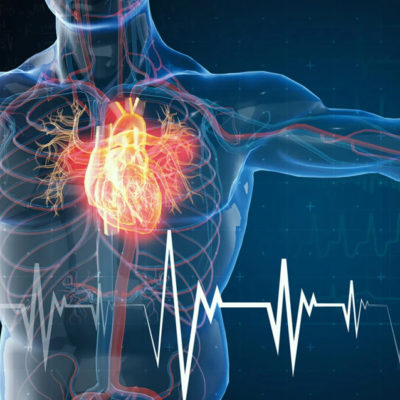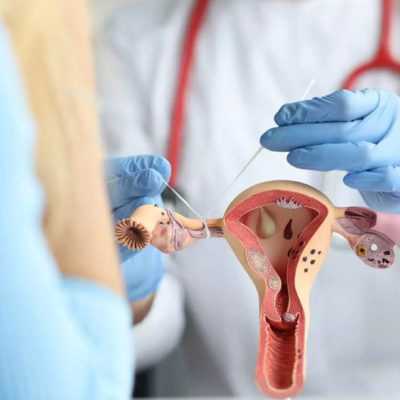Breast cancer is on the rise, but new tools for early detection could save lives. In Journal of Vacuum Science & Technology B, by AIP Publishing, researchers from the University of Florida and National Yang Ming Chiao Tung University in Taiwan reported successful results from a hand-held breast cancer screening device that can detect breast cancer biomarkers from a … [Read more...]
Key to Healing Injured Hearts
A groundbreaking scientific study published in Nature Cardiovascular Research has unveiled a remarkable discovery that may have far-reaching implications for the treatment of heart disease. The intensive investigations utilizing single-cell genomics and genetic experiments were conducted by a team of scientists in theCardiomyocyte Renewal Laboratory and McGill Gene Editing … [Read more...]
Artificial Intelligence and Immunity
Researchers from Cleveland Clinic and IBM have published a strategy for identifying new targets for immunotherapy through artificial intelligence (AI). This is the first peer-reviewed publication from the two organizations' Discovery Accelerator partnership, designed to advance research in healthcare and life sciences. The team worked together to develop supervised and … [Read more...]
Different Pain Types in Multiple Sclerosis can Cause Difficulty Ataying Active
For patients with multiple sclerosis, a regular exercise routine is important for managing symptoms. Due to different causes of chronic pain though, physical exercise can be more difficult for some. Research published in the Journal of Pain from the University of Michigan found that widespread pain with nociplastic features, also known as WPNF, can make engaging in physical … [Read more...]
Participants in School-Based Gardening and Food Programs Benefit From Lasting Impacts on Dietary Behaviors
To encourage fruit and vegetable consumption among youth, experiential food education programs such as gardening and cooking lessons have increased across both community and school settings. A recent research article in the Journal of Nutrition Education and Behavior, published by Elsevier, revealed how this early learning positively influenced food decisions as children grew … [Read more...]
Study Charts Possibilities for a Better way to Diagnose Gestational Diabetes
Pregnancy weight and biochemical markers measured in blood from women with gestational diabetes mellitus (GDM) were related to increased risk of poor pregnancy outcomes, suggesting a new direction for precision diagnostics, according to researchers. The study led by Ellen C. Francis, an assistant professor in the Department of Biostatistics and Epidemiology at Rutgers School … [Read more...]
Study: Cuddling During Sleep Comes at a Cost, Even for Mice
If you’re having trouble sleeping, perhaps contact with a bedmate is causing the problem, say University of Michigan researchers. Ada Eban-Rothschild, assistant professor in U-M’s Department of Psychology, and colleagues tracked the sleep behavior of mice while in a social context. They noticed that these small rodents seek physical contact prior to sleep initiation and … [Read more...]
Elevated Pregnancy Blood Pressure may Leave Lasting Marks on the Heart
New research from the Smidt Heart Institute at Cedars-Sinai found that women who developed signs of elevated blood pressure during pregnancy were more likely to have residual evidence of abnormal heart structure and function up to a decade after the pregnancy. "This study helps to clarify that, for some women, pregnancy is not just a 'stress test' that unmasks underlying … [Read more...]
Dietary Shifts to Less Processed Foods Significantly Lower Triglycerides in Women
During reproductive age, poor nutrition quality increases obesity rates and, as a result, the risk of cardiovascular disease (CVD) and type 2 diabetes. Dyslipidemia also impacts health, particularly among women with polycystic ovary syndrome (PCOS). In pregnant women, elevated triglycerides increase the risk of gestational diabetes, which can lead to type 2 diabetes and CVD … [Read more...]
People With Obesity Burn Less Energy During Day
Weight influences how and when bodies burn energy, new research indicates. An Oregon Health & Science University study published in the journal Obesity found people who have a healthy weight use more energy during the day, when most people are active and eat, while those who have obesity spend more energy during the night, when most people sleep. The study also found … [Read more...]
Measuring Long-Term Heart Stress Dynamics with Smartwatch Data
Biomedical engineers at Duke University have developed a method using data from wearable devices such as smartwatches to digitally mimic an entire week's worth of an individual's heartbeats. The previous record covered only a few minutes. Called the Longitudinal Hemodynamic Mapping Framework (LHMF), the approach creates "digital twins" of a specific patient's blood flow to … [Read more...]
New Research Links High Salt Consumption to Risk of Type 2 Diabetes
Those at risk for Type 2 diabetes may already know to avoid sugar, but new research suggests they may want to skip the salt as well. A new study from Tulane University published in Mayo Clinic Proceedings found that frequently adding salt to foods was associated with an increased risk of developing Type 2 diabetes. The study surveyed more than 400,000 adults registered in … [Read more...]
Shortening Sleep Time Increases Diabetes Risk in Women
A new study at Columbia University has found that shortening sleep by just 90 minutes for six weeks increased insulin resistance in women who are accustomed to getting adequate sleep. The effect was even more pronounced in postmenopausal women. The recommended amount of sleep for optimal health is between seven and nine hours per night, yet about one-third of Americans get … [Read more...]
Increasing Steps by 3,000 Per Day can Lower Blood Pressure in Older Adults
A new study including Linda Pescatello, distinguished professor of kinesiology in UConn's College of Agriculture, Health and Natural Resources, found that adding a relatively minimal amount of movement, about 3,000 steps per day, can significantly reduce high blood pressure in older adults. Pescatello worked with Elizabeth Lefferts, the lead author of the paper, Duck-chun … [Read more...]
Women with PCOS on Keto Diet may see Improvements in Fertility
The ketogenic (keto) diet may lower testosterone levels in women with polycystic ovary syndrome (PCOS), according to a new paper published in the Journal of the Endocrine Society. PCOS is the most common hormone disorder in women, affecting 7-10% of women of childbearing age. It can cause infertility and raises the risk of developing diabetes, obesity and other metabolic … [Read more...]
Trial Show Treatment Designed to Clear Senescent Cells in Alzheimer’s Disease is Safe
Alzheimer's disease is the most common cause of dementia that affects more than 6.5 million Americans, according to the Alzheimer's Association. To find effective treatments and slow the progression of this debilitating disease, researchers have made much progress in developing new drugs that target beta-amyloid plaques, one of the hallmarks of Alzheimer's … [Read more...]
Diet Tracking: How Much is Enough to Lose Weight?
Keeping track of everything you eat and drink in a day is a tedious task that is tough to keep up with over time. Unfortunately, dutiful tracking is a vital component for successful weight loss, however, a new study in Obesity finds that perfect tracking is not needed to achieve significant weight loss. Researchers from UConn, the University of Florida, and the University of … [Read more...]
How to Prevent a High-Fat Diet From Throwing Metabolism Out of Whack?
The UC Irvine research centered on a protein complex called AMPK, which senses the body's nutrition and takes action to keep it balanced. For example, if AMPK detects that glucose is low, it can boost lipid breakdown to produce energy in its place. Scientists have known that consuming high amounts of fat blocks AMPK's activity, leading the metabolism to go out of balance. … [Read more...]
Non-Biological Factors and Social Determinants of Health Important in Women’s CVD Risk Assessment
"Risk assessment is the first step in preventing heart disease, yet there are many limitations to traditional risk factors and their ability to comprehensively estimate a woman's risk for cardiovascular disease," said Jennifer H. Mieres, M.D., FAHA, vice chair of the scientific statement writing committee and a professor of cardiology at the Zucker School of Medicine at Hofstra … [Read more...]
Beetroot juice: Significantly Increases Muscle Force During Exercise
While it is known that dietary nitrate enhances exercise, both boosting endurance and enhancing high-intensity exercise, researchers still have much to learn about why this effect occurs, and how our bodies convert dietary nitrate that we ingest into the nitric oxide that can be used by our cells. To help close this gap, researchers at the University of Exeter and the U.S. … [Read more...]
Assessing the Risk of Excess Folic Acid Intake
"However, there is a lack of research on whether excessive folic acid intake has the potential to harm human beings," said co-corresponding author, Dr. Richard H. Finnell, William T. Butler, M.D., Distinguished Chair Professor in the Center for Precision Environmental Health and the departments of molecular and cellular biology, molecular and human genetics and medicine at … [Read more...]
Study Reveals New Understanding of How Androgen Therapy Affects Breast Tissue
Transgender men who were assigned female at birth and identify today as male may take hormones called androgens to induce physical changes that help them align their physical appearance with their identified gender. Androgens such as testosterone are involved primarily in the development of male traits, although females also produce androgens. Molecular changes observed in … [Read more...]
Adding Antipsychotic Med to Antidepressant May help Older Adults with Treatment-Resistant Depression
Aripiprazole originally was approved by the FDA in 2002 as a treatment for schizophrenia but also has been used in lower doses as an add-on treatment for clinical depression in younger patients who do not respond to antidepressants alone. The new findings are published March 3 in The New England Journal of Medicine and are to be presented that same day by Eric J. Lenze, MD … [Read more...]
Mocktails or Cocktails? Having a Sense of Purpose in Life can Keep Binge Drinking at Bay
Using functional MRI (fMRI) scanning technology, researchers from the University of Pennsylvania, Columbia University, and Dartmouth College examined the relationship between these cues, alcohol craving, and alcohol consumption. They found that having a strong sense of purpose in life decreases the temptation to consume alcohol to excess among some social drinkers. Why … [Read more...]
Will Revitalizing Old Blood Slow Aging?
Many scientists are looking for the elements of young blood that can be captured or replicated and put into a pill. But what if the best way to get the benefits of young blood is to simply rejuvenate the system that makes blood? "An aging blood system, because it's a vector for a lot of proteins, cytokines, and cells, has a lot of bad consequences for the organism," says … [Read more...]
Rhythmic Eating Pattern Preserves Fruit Fly Muscle Function Under Obese Conditions
Obese fruit flies are the experimental subjects in a Nature Communications study of the causes of muscle function decline due to obesity. In humans, skeletal muscle plays a crucial role in metabolism, and muscle dysfunction due to human obesity can lead to insulin resistance and reduced energy levels. Interestingly, studies in various animal models have shown that … [Read more...]
Effect of Dietary Choline Deficiency on Neurologic and System-Wide Health
It's estimated that more than 90% of Americans are not meeting the recommended daily intake of choline. The current research, conducted in mice, suggests that dietary choline deficiency can have profound negative effects on the heart, liver and other organs. Lack of adequate choline is also linked with profound changes in the brain associated with Alzheimer's disease. These … [Read more...]
Preterm Birth Linked to Chemicals Found in the Vagina, Study Finds
The study of 232 pregnant women found that a handful of non-biological chemicals previously found in cosmetics and hygiene products are strongly associated with preterm birth. "Our findings suggest that we need to look more closely at whether common environmental exposures are in fact causing preterm births and, if so, where these exposures are coming from," says study … [Read more...]
Feeling Depressed? Performing acts of Kindness may help
People suffering from symptoms of depression or anxiety may help heal themselves by doing good deeds for others, new research shows. The study found that performing acts of kindness led to improvements not seen in two other therapeutic techniques used to treat depression or anxiety. Most importantly, the acts of kindness technique was the only intervention tested that … [Read more...]
Consumption of Fast Food Linked to Liver Disease
A study from Keck Medicine of USC published today in Clinical Gastroenterology and Hepatology gives people extra motivation to reduce fast-food consumption. The study found that eating fast food is associated with nonalcoholic fatty liver disease, a potentially life-threatening condition in which fat builds up in the liver. Researchers discovered that people with obesity … [Read more...]





























